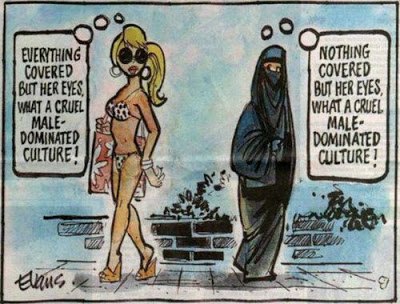Let’s face it: most religious texts are pretty sexist. Sure, they are a product of their time. Yes, they were written by a bunch of old men. If this is so, why are we still following so many of their outdated, misogynist teachings? Do we really know what we are agreeing to when we say “amen?” Let’s take a closer look at what some major Western religious texts have to say about women.
If you live in the United States, you probably know a lot of Christians. Did you know that according to the Old Testament (which is also observed by Jews and Muslims), women are required to be silent and submit to their husbands? In fact, women are traditionally disallowed from participating in Christian churches as clergy. This is because, as Genesis tells us, women were made from a man’s rib bone, in order to serve as a companion to men. Unfortunately, this view of women as inferior has led to all kinds of unfair treatment. The “Quiverfull” movement is a perfect example of this. Quiverfull families aim to have as many children as God “wants” them to, eschewing all forms of birth control. Now, of course, they have the freedom to do this. However, it is unfortunate that most Quiverfull families also believe that woman’s sole duty is to birth babies and care for them. Vyckie Garrison, the author of the ex-quiverfull blog “No Longer Quivering,” speaks about the births of her many children, which were all at extreme detriment to her health. When she discussed this concern with her pastor, he told her that if she died doing her duty to God (having children), God would provide for her family, and that was that. Because women usually do not work, they are entirely economically dependent on their husbands, which paves the way to emotional and physical abuse.
Of course, the Old Testament isn’t the only sexist holy book. The Quran has plenty of passages about how Allah feels about women. For example, at one point, Muhammad asks, “Is not the evidence of two women equal to the worth of one man?” When his listeners agree, he says, “This is the deficiency in her intelligence.” In addition, women are instructed to cover much of their bodies, and not much interaction between men and women is allowed. Modesty is highly valued in Islam (and many other religions). Rules about modesty are the foundation of victim blaming. If we set an expectation that women avoid “distracting” men to keep them from impure thoughts and actions, we are implicitly putting the blame on women for the actions of men. It also makes us think that men are animals that cannot control themselves and cannot be held accountable for what they do, should they see an attractive woman. Indeed, some religions go so far as to require women to make themselves ugly for other men. Certain sects of Hasidic Jews require women who are married to shave their heads regularly so that men other than their husbands would not think they were attractive and lust after them. Ironically, many of them wear a wig over their shaved scalps, which they say is OK because it is not their real hair.
Of course, people of any religion can be feminists. Just because one’s holy book contains sexism doesn’t mean that one can’t be against sexism while following their religion. No major religion follows their book to the letter. For example, in Leviticus (Old Testament) there are hundreds of totally forgotten rules, including one forbidding people from wearing clothing made from more than one type of fiber. I don’t see many people in the modern world following that rule. What religion should be about is being the best person one can be, and if one needs a god to help them do that, then fine.



